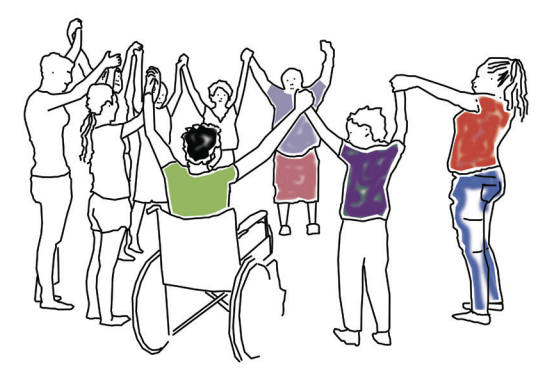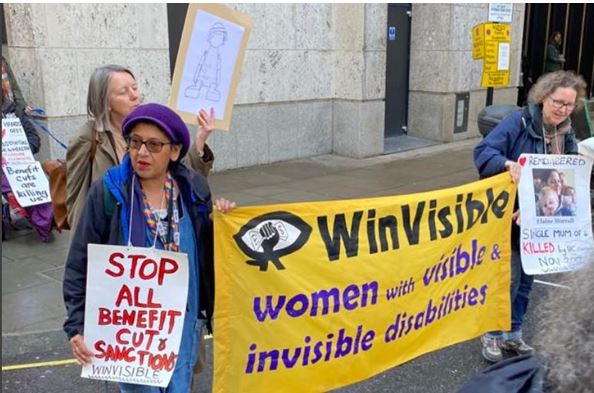WinVisible group member Ms X says:
“I’m a mum of three (my children, too, have health conditions), looking after them with support from family. I’m a single mum, survivor of domestic violence and sexual abuse. I have PTSD and physical debilitating chronic health conditions. Many of my symptoms are invisible and fluctuating. I’m battling daily with pain, persistent fatigue, nausea, brain fog and low energy levels, profoundly affecting my daily life. I had to give up waged work.
As my health is complicated, I’m under a range of consultants in different hospitals and clinics, which means I have a lot of medical evidence of my conditions. Regardless of that, when my PIP came up for reassessment, it was a massive fight to get my claim assessed on paper, and to finally win PIP at enhanced levels.
The process often left me stressed and in tears. I persevered with support from WinVisible, and the help of friends and family.
When you’re not believed about invisible disabilities, the emotional toll can be profound. It’s like being trapped in a constant battle to justify your experiences and validate the very real challenges you face every day. It’s not just a matter of having your symptoms doubted, it’s a deeply personal rejection of your reality and identity. The feeling of being dismissed or invalidated can weigh heavily on your self-esteem and mental well-being, leaving you feeling isolated, misunderstood, and even gaslighted. It can erode trust in healthcare providers, making it difficult to seek help or advocate for your needs.
Overall, the experience is a stark reminder of the pervasive stigma and ignorance surrounding invisible disabilities, which only adds to the already burdensome journey of managing your condition.
Everyone is complaining that the DWP is sending out PIP reassessments years before our PIP end date, and the process takes forever, causing immense anxiety. A survey last year found that 430,000 disabled people are waiting, missing out on an estimated £24m a month.
I got in touch with WinVisible for help with my PIP review form in November 2022. In January 2024, 14 long months and many twists and turns later, I finally got the news that I was awarded PIP at the enhanced highest rates for both mobility and daily living, awarded until January 2030.
I sent in my PIP review form back in December 2022. My health had worsened, especially after COVID, hence I was applying for a PIP increase. I called the DWP to ask for a bit more time to return the completed form and medical evidence. They told me there’s a one year backlog, and I could send in more medical evidence later by post.
Up to August 2023, I called the DWP several times to ask what was happening with my claim, only to be told that it was still in a queue.
By August 2023 my health had worsened again and the DWP asked for more medical evidence as proof of my additional conditions. I posted this in September 2023.
I wrote to them asking for a paper-based assessment, which they can arrange according to the DWP guidance to the assessor companies (1.5.5 bullet point 3 — see also WinVisible’s page with leaflets on exemption from PIP or work capability interviews).
I just couldn’t face an interview, not in person and not on the phone. My anxiety levels were through the roof already, and the thought of an interview pushed me over the edge. They said there wasn’t sufficient evidence to decide. WinVisible women then helped me to write a more detailed personal statement about how my health had worsened, and specifically how this increased my needs.
After this, I called the DWP several times to find out if a paper-based assessment had been granted, only to be told that my claim is with an assessor (IAS – Atos), and a decision about the paper-based assessment will be made soon.
A few days before Christmas 2023, I received a text message asking me to come in for a face-to-face interview on 3 January. My anxiety went through the roof. It was holiday time, but because it was urgent, WinVisible got back to me to talk about it and see what to do.
I called PIP twice – the first time around they confirmed that a paper-based assessment is not possible, despite my stress level. I didn’t give up and called again, and that time to spoke to someone more understanding. He cancelled the face-to-face assessment and requested a paper-based assessment. He asked me if there is anyone else supporting me other than GP or any other medical professionals, so I gave him WinVisible’s phone number.
A PIP paper-based assessment is often not just looking at paperwork, usually the assessor will call the claimant’s GP or other professionals. Although they often don’t allow enough time to reach busy people, as they impose short deadlines to complete the assessments. In my case, the assessor contacted WinVisible and they arranged a phone call later, wanting to check my current situation before speaking to them. Some details of my treatment, only I knew, so in the end the assessor wanted to call me as well, and I was on the phone for about half an hour. But I had the backing of WinVisible, and we didn’t want IAS to have any excuse that they couldn’t speak to me, couldn’t complete their assessment, to underrate my needs.
A couple of weeks later I saw a lump sum payment from the DWP into my account. I called them and they confirmed that I had been awarded enhanced PIP for daily living and mobility. It was such a huge relief! The backdated money and ongoing higher payments have helped me to pay off debts, such as my energy bill, and also access complementary medicine (herbalist/acupuncture), so crucial for my recovery. I was feeling more and more unwell, it couldn’t have come at a better time. Now, I feel, I can start healing.

A BIG thank you to WinVisible women for all their help and support!
Having a supportive community makes all the difference when navigating the challenges of invisible and visible disabilities. WinVisible’s dedication to providing understanding, validation, and advocacy for individuals with both invisible and visible disabilities is invaluable. Their support likely not only validates your experiences but also empowers you to advocate for yourself and others in similar situations. Having a supportive network like WinVisible can bring a sense of belonging and solidarity, reminding you that you’re not alone in your journey.”

